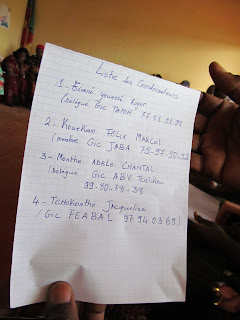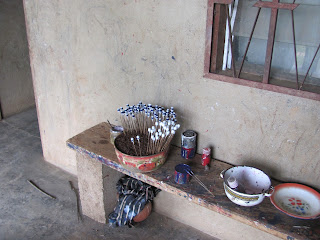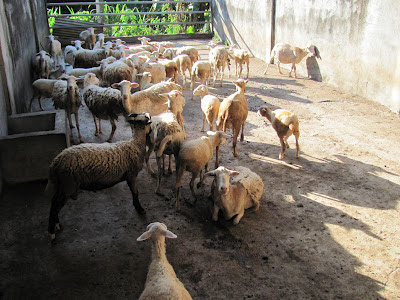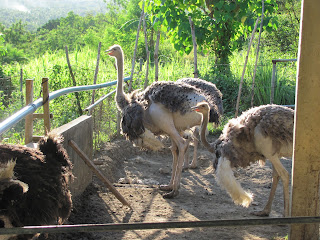Farm Field Schools North West Cameroon
November
2012, a three day introduction to ‘Conservation Farming’ was conducted in
Bana. This workshop introduced some
fifteen farmers to the basic concepts of Conservation Farming. Genuine interest led Mme. Oussematou of
Integrated Development Foundation (IDF) to apply through to Canadian Executive
Service Organization (CESO) to have Allan Sorflaten, PAg MSc to design and
implement a Farm Field School Training
program aimed to conduct a Field Trial in the Bana Region.
Mme.
Oussematou visited Bana twice before we arrived to meet with Department of Agriculture
officials, community leaders and farm groups.
Alden Braul
of the Canada Food Grains Council headquartered in Winnipeg has been a great
source of help. Pictured below is Allan
meeting with Alden Braul in Winnipeg in early October.
Step One: Ground Working in Bana:
Following
the nine steps involved in setting up and running a Farmer Field School
prepared by Benjamin Mweri, the first step is Ground Working:
‘The objective of ground working is
to determine the actual need of the community farmer groups which will
eventually form the basis for developing the Farm Field School (FFS) curriculum
and field trials of the FFS.’
This process
was begun during the Conservation Farming Introduction Workshop in November
2011 and continued by Mme. Oussematou during the ensuing year and was
further continued in the FFS training that was conducted November 19th
20th and 21st, 2012. Mme Oussematou has very carefully seen to it that all of the required bases have been covered in so far as getting government policy makers at highest level on side with this project.
Mme. Oussematou
also carefully planned an organizational
visit to Bana as part of our first two working days.
Bana is midway between Douala where we arrived in Cameroon and Bamenda where we were headquartered. This strategic planning set the stage for the upcoming workshops.
Ministry of Agriculture.
Below are
Mme. Oussematou and Allan with Emmanuel Mathuri, the Delegue Departmental for
the West Region of the Ministry of Agricultue and Rural Development, an
Agricultural Engineer by training.

Mr. Mathurin emphasized the need for good seeds, good organic compost, chemicals to control plant disease, good fertilizer, good water to irrigate: ie, every product input must be good if you want a good product to go to market. He talked about the need to have a validation of location of the plot before beginning. He talked about the need for caution in introducing a new plant species: for example, research is being done here on a legume tree that has been successfully used in other countries in Africa. Financial resources really are non existant but the need for food security is critical he said.
Mr. Mathurin was very impressed with the Field Study Guide and the other information materials that were prepared for the workshop.
Phillip Mouadjo is the
Divisional Representative for the Ministry of Agriculture. Below
Phillip greets Mme. Oussematou at the center where the first meeting with a
farmers’ group was held. The picture
below is the evening before, showing Oussematou and Phillip during one of the early planning
meetings.
The
Department of Agricultural Representative in Bana, Jean Waoupi ‘M'Bou’
was indispensable as translating the Conservation Farming workshops last year into local dialect. We were a little worried when we met him
wearing his parka. Bana’s elevation
gives it an advantage of cooler breezes. As you see him below, ‘M'Bou’ is wearing his parka
and riding his motorcycle back to Bafang. We
think he is a little cold blooded! We
enjoy good laughs!
Step Two: Identification of FFS Participants:
Farm Groups
Farm groups
appear to be well established around Bana.
Farmers must organize to apply for government assistance. Materials or technical support must go to a
group, not an individual. As well, by
coming together input costs are reduced (for example, buying 30 bags of fertilizer is cheaper than buying individual bags).
In organizing
for these Farmer Field School workshops, Mme. Oussematou wanted to include two populations; the youth who are needed to sustain farming the long term and women who tend to be the majority
of farmers and thus represent future food security. In During her two trips to
Bana to organize for these meetings, she met with each level of
government and community leaders in an effort to identify farm groups and plan the selection process for participants. This rigorous planning and
scheduling later proved to be very fruitful.
Meetings
were dynamic. A representative of the
Ministry of Agriculture was present at each. The Sorflatens introduced themselves (in
French) followed by further elaboration from Mme. Oussematou. The principles of Conservation Agriculture
also were introduced. The aim of each of the
four meetings was for each group to choose among themselves the participants that would attend
the Farm Field workshop. The groups were
instructed to choose participants (to be known as FFS coordinatores) who are competent, of high moral character, respected,
available and willing to give a time commitment of at least one half day for every
two weeks of the growing season. Groups
were left totally on their own to choose their representatives. The groups found it a challenge to do this . Regional representation had to be considered and everyone wanted to participate. But they recognized that only a limited number of leaders could be chosen to carry the training into the field.
First Meeting: Bana Group 10:45 Friday, November 9th.
Below is
pictured Phillip Mougdjo, Divisional Representative for the Minister of Agriculture who is talking to the first group. This group was exceptional in that there were
more men (12) than women (6). Several
young men from the Ecole de Formation taking the Agricultural Technicians
course were part of this group.
After
introductions and presentations, Mme Oussematou asked the group to vote. Were they interested in the program? Notice how intently the group is listening in
the first picture. In the second picture, a vote is taking place on the decision to proceed. The decision was
unanimous.
Then the meeting
was recessed. Participants left and met on their own to choose four representatives or coordinators. They again were reminding of the selection
criteria to be used. After much deliberation, the four coordinators were selected by the
group:
Meeting at Integrated Development Foundation (IDF) Bana 2:00pm Friday November 9, 2012.
This participant selection meeting was somewhat nostalgic for us as some of
the participants were farmers who attended the Conservation Farming Workshop
held in Bana November 2011. The picture
below shows farmer Victor who led our farm tour last November with Mme
Oussematou, our dynamic translator from the Ministry of Agriculture, Jean Waupi (note the parka!)
and Allan in his cool shirt!
The ladies took time out from choosing their coordinators to pose for this picture.
This group
with its 15 members, after the initial information session in Conservation Farming
last November (2011), was so enthusiastic that they went ahead with limited
knowledge and resources and planted 10,000 square meters (1 hectare) to see how
they would get along. Their own
experiences included individual
comments as follows: --weeding was reduced because grass did not grow; problem
with rats coming to remove the maize seeds; some areas were replanted several times because of rats and
they decided to plant beans on the fifth cycle; in one case the maise germinated but problems existed with yield; he
tried Irish potatoes but there was some kind of disease so production was limited; one
group used rabbit manure,had concerns about the quality of mulch, birds removed
some seeds, production was good.
Leaders were
impressed with the enthusiasm of the group but cautioned that the initial
introduction was intended as an information session only. There was no measured test plot, no consideration of soil condition, limited resources, questionable seeds, limited knowledge, etc. Allan recommended a test plot, more information and more resources (the kind of things that could be considered in the FFS).
Meeting at Integrated Development
Foundation (IDF) Bana 4:00pm Friday November 9, 2012 with members of the
Cameroon Baptist Ministry of Bana.
Pastor Moses
has been ministering to the Bana Baptist congregation since 2002. Pastor Moses trained in
Veterinary Medicine in Nigeria before attending Bible Training College. There is a group of young people from the
church very interested in the Conservation Farming Project. Below see Allan and Pastor Moses in a planning discussion. Pastor Moses
arrives on his motorcycle.

Below is the
group from the church and the person chosen from the Bana Baptist
Ministry to participate in the FFS.
Amazing what
was accomplished in two days of preparatory
planning, all thanks to the earlier background work of Mme. Oussematou.
Written while on the ground in West Cameroon.
Written while on the ground in West Cameroon.
Allan and
Lydia Sorflaten
























































